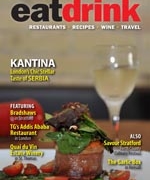After a successful career in political journalism, covering stories like the Homoka and Bernardo murder trial and the dismemberment of John Wayne Bobbitt, Jay Rayner turned his attention to becoming a restaurant critic, thinking that fancy food may be a respite from these heavier topics. One of the first things he realizes in his career change is that “nobody goes to restaurants for nutritional reasons” but rather for enjoying the culinary experience of fine dining. Noticing that high-end restaurants were cropping up around the world, Rayner heads out on a globetrotting menu melee, traveling to find his perfect meal and documenting his trips to seven cities in The Man Who Ate the World: In Search of the Perfect Dinner.
Starting in Las Vegas, when the restaurant scene is graduating from its customary all-you-can-eat buffets to gourmet restaurants, Rayner samples the type of cooking from Wolfgang Puck, Thomas Keller, and Joel Robuchon that is intended to launch Vegas into a destination known for more than gambling. Rayner never strays far from his political journalism background and his trip to Moscow focuses as much on the food as the Mafia-style criminal activity, with restaurants riddled not only with expensive meals, but also the bullet holes of “bad old days of business-motivated assassinations.” Now, to him, the restaurants are a symbol of elitism; the decadence and opulence of the restaurant décor and the uninspiring menu items leads him to believe that “no one cares about the food. Just as in Soviet times, they only care that they are part of an elite who can visit them.”
The book is as much a cultural critique of the countries he visits as a look at their cuisine, such as the outlandish prospect of Dubai building bigger and better things. He is told that food coming into Dubai has quality issues due to Islamic laws, which is absurd given that the Dubai juggernaut (attempting to make the highest drawing tourist destination in the world) attracts the best chefs to run the most exclusive restaurants. He does have issues with the authenticity of the place, however, eating a poor attempt at Swiss fondue as he watches people ski on snow inside a mall in a 74 degree desert. Dubai may be an amazing place, but his food experiences were unmemorable. He can’t even say too many nice things about his British compatriot, Gordon Ramsay, who has set up shop there.
The Tokyo segment was my favourite in the book. Restaurants are so numerous in the Japanese metropolis that they are literally piled on top of each other and Rayner has no shortage of tales about being forced to eat the most unusual items from the Japanese culinary repertoire. He momentarily fears the Japanese chefs are “throwing all the weird stuff at me that nobody ever eats to see whether I’d be too polite to refuse” (139). Rayner does hold a personal philosophy that you must try everything once, if at least to say that you don’t like it, even if it is blowfish sperm, or lavender ice cream in green bean soup, or the trial of eating slimy sea urchin with chopsticks which is “like trying to eat jelly with knitting needles.”
His experiences tend toward the outlandish, garish, and extravagantly expensive. He makes no bones about the conspicuous consumption of modern restaurants; eating extravagantly requires extravagant spending (most often on the business dime of the London Observer). He is flirting with meals that are rumoured to be $1,000 a head in Tokyo, meals that bring to mind “an image of my platinum credit card, that dear sliver of gunmetal gray plastic that had become such a friend to me on this journey, now suddenly belching smoke, Mission: Impossible style, as it came into contact with the bill.”
He delves into the philosophy about why Michelin-starred restaurants even exist if only to please greedy eaters with no limits to their spending. “Travelling the world through its greatest restaurants, in search of the perfect meal, had made me question the point of them.” This questioning of a career that pursues a love of expensive food ultimately leads to one last hurrah in Paris to taste test seven restaurants in seven days. He likes some, abhors others, and ends his last night shaking his head at a $1,250 bill for two. He believes he had flashes of perfection, including L’Astrance in Paris and a sushi meal at Okei Sushi in Tokyo (the $475 bill being the highest he has ever paid for a single meal). Ultimately, Rayner concludes that his quest to write about the perfect meal may go unfulfilled because perfection is based on individual appetites. On a more personal level, he says, “My pursuit of the perfect meal was doomed to failure because I had been conducting it in entirely the wrong company, which is to say, my own.” This is when he returns to his hometown of London, England to dine at several of his favourite restaurants with his wife, making the statement that communing in the right company can make a meal taste better.
It is these personal touches from Rayner’s life that make his globetrotting narrative most enjoyable, whether or not he has more misses than hits at perfection. Even while dining in establishments once frequented by the Rat Pack in Vegas or the Russian first lady in Moscow, he attributes his family’s love affair with food for his good fortune of having a job that consists of eating in restaurants. But what should we expect from a man who tells us that one of his most lasting memories of childhood is sneaking away on a school trip four nights in a row to eat escargot in a nearby French restaurant instead of skiing with his friends?

